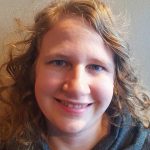
The DLF mission reads: “The Digital Library Federation is a robust and diverse community of practitioners who advance research, learning, and the public good through the creative design and wise application of digital library technologies.” The “closing plenary” called this community of practitioners to set an agenda together going forward for the public good. The moment brought the distinct conversations of the past three days back to the call for a socially engaged, critical, and thoughtful practice.
As part of DLF Director Bethany Nowviskie’s continued efforts to “decenter the leadership of DLF,” she invited ten diverse stakeholders from the DLF community to give three minute snippets of their visions for DLF going forward. Kelcy Shepherd spoke on bringing Liberal Arts Colleges more fully into the community and making a concerted effort to strengthen the voices of less well-resourced institutions in DLF. Multiple panelists echoed this, as did one of DLF’s Cross Pollinator Fellows during the open commentary period at the end, Yasmeen Shorish from James Madison University, who called for more support for public comprehensive universities who may not have the funds to join DLF. Coming from a comprehensive university myself, I noticed that there were not very [pullquote1 align=”right”]Multiple stakeholders called for an active, concerted effort to center under-represented and mis-represented voices both within the digital library community and in the work that we do toward the public good.[/pullquote1]many of us last year at my first Forum. In addition to Nowviskie’s call to include more HBCUs and public libraries, it made me happy to see this concern raised.
Multiple stakeholders called for an active, concerted effort to center under-represented and mis-represented voices both within the digital library community and in the work that we do toward the public good. Oliver Bendorf, a program associate with DLF, offered a moving comparison of his experiences with transition as a transgender individual to the transition of libraries and the information we steward toward the digital. Hannah Scates Kettler celebrated the safe space that DLF offered to wrestle with the complex ethical questions of the work we do. Mark Matienzo from DPLA called for DLF to be a place where we can be held accountable for the systems that we build with a mind to make change in these systems. With this in mind, two community comments asked how we could push outward this drive to make inclusive digital libraries. How do we make sure that we are not simply talking to those who we know agree? What form of advocacy and should DLF be involved in as it grows and becomes more capable of doing so?
The other thread that resonated with me was a call to collaboration and a celebration of community as a way to push change. Max Marmor called for further support of museum involvement and sharing tools, thoughts, and tactics between the museum and the library communities. Amy Buckland called for us to take the “big scary hairy things” that the DLF Forum wrestles with out to those who are not able to attend these conferences. Many of the panelists lauded the space that DLF offers for uncomfortable conversations, for mentorship, for sharing and spreading ideas. It seemed that much of DLF wanted to seek a space where DLF was maximizing the people that could be brought into conversations about digital libraries while not [pullquote1 align=”left”]Amy Buckland called for us to take the “big scary hairy things” that the DLF Forum wrestles with out to those who are not able to attend these conferences.[/pullquote1]losing the intimacy that encourages unfettered, meaningful conversations.
In my closing post, I have attempted more detail about the series of events for this one particular #ourDLF session because I feel that the content of this single session is almost a microcosm of the whole of the conference. Perhaps this is a weird metaphor, but I think of the closing keynote and opening keynote of a conference as either side of a plastic bracelet connector or a belt buckle, connecting to each other to make a rounded complete experience. This closing keynote/plenary session was unlike any I had seen before, but I feel that it was successful. Safiya Noble’s keynote was a call to action. Her statement, “What would our technology look like if no one had to die for it?” will long remain with me. The #ourDLF closing session was a response, asking how, specifically, DLF as a community and digital libraries in general can be leveraged for the public good. In the closing remarks, Chuck Henry, president of CLIR, offered, “it’s important to see the digital library as we see it here, always, as an extension of our humanity.” As a profession, librarians tend toward the thoughtful, but pragmatic. This allows us to not only deeply consider what digital libraries that function as an extension of our humanity look like, but also to make these libraries actual. To open dialogue and conversation, for the purpose of then moving forward based on that dialogue and conversation. To use technology as a way to enhance our empathy and connection to each other. Opening and encouraging these conversations is a beautiful step, but it will take every individual involved in digital libraries, whether or not they are involved in DLF, to make these conversations a reality. In their calls for more inclusiveness, community, and collaboration, the individuals that shared during the #ourDLF closing session understood this. And I look forward to seeing how the DLF community supports digital libraries as technology for the public good.
Megan’s Forum 2015 Updates: October 25 (DLF LAC Preconference) | October 26 | October 27.
